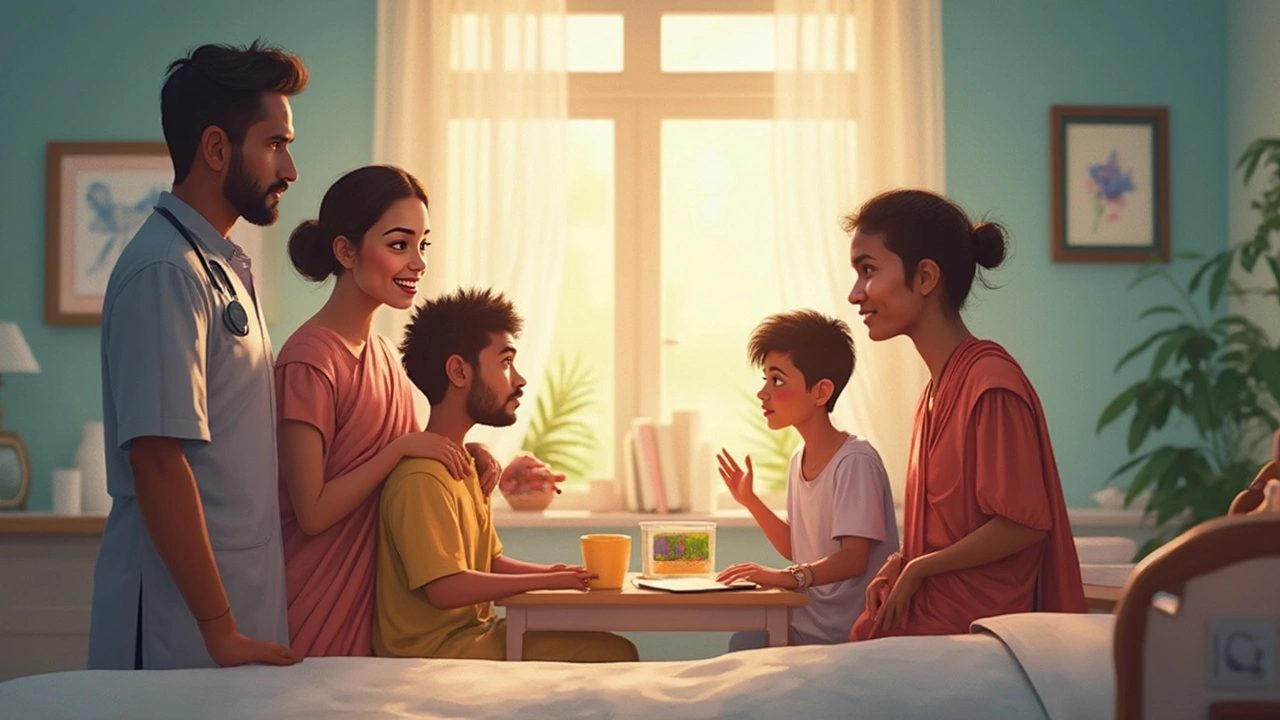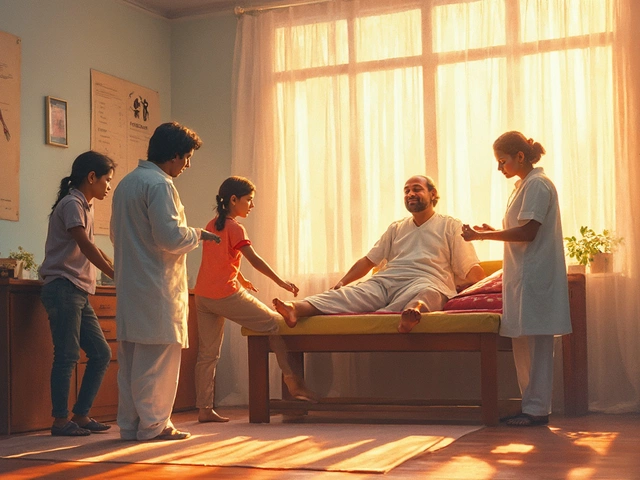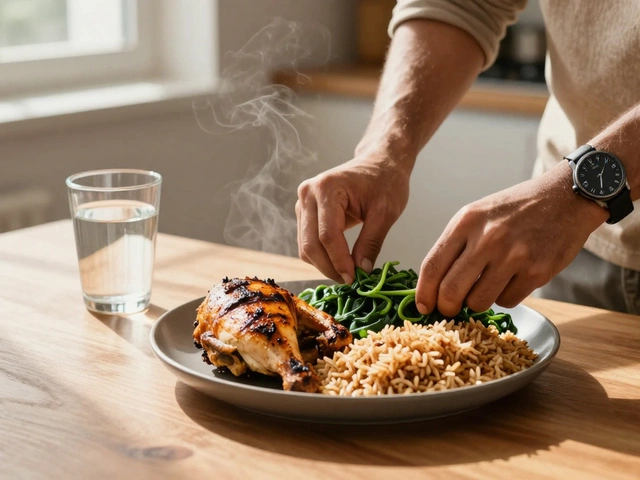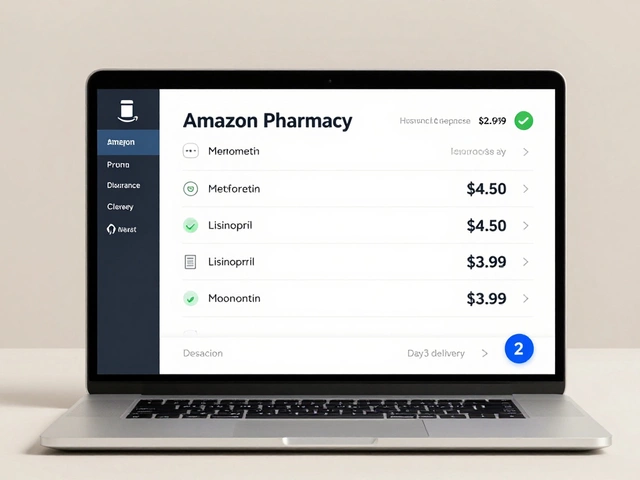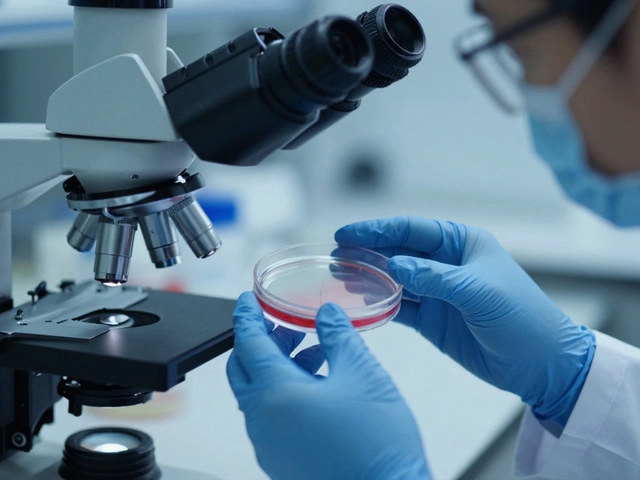If you ask people what cancer patients need most, a lot jump straight to medicine or maybe a miracle cure. But anyone who's been through it (or walked alongside someone who has) knows that the stuff that actually helps can be surprisingly simple.
First, honest conversations with your doctors are gold. No sugar coating or medical jargon—just straight answers about what's going on, what to expect, and what you can actually do. This way, you’re in the driver’s seat, not just along for the ride.
Side effects can get nasty fast. Hair loss, fatigue, nausea—it's not just in your head or something you should “power through.” Knowing what’s coming and having clear ways to tackle it changes how tough the journey feels from day one.
- Straight Talk from Doctors
- Staying on Top of Side Effects
- Support You Can Actually Use
- Food, Rest, and Moving Around
- Keeping Spirits Up
- What Family and Friends Can Do
Straight Talk from Doctors
You know what drives cancer patients up the wall? Vague answers and medical talk that means nothing outside a textbook. If you’re sitting across from your doctor, you need clear info about your cancer treatment—no guessing, no sugarcoating. Studies from Mayo Clinic show that patients who feel listened to and clearly informed about their options are less stressed and more likely to stick with their treatment plan.
Don’t wait for the doctor to unload everything at once. Instead, it helps to show up with a list of questions ready, like:
- What’s my exact diagnosis, and what does it mean?
- What are my treatment options—can we compare them side by side?
- What side effects should I actually expect, not just the rare ones?
- How will this affect my daily life—jobs, driving, eating?
- When should I worry about certain symptoms, and who do I call?
Here’s the deal: you have every right to ask for straight answers. It’s your body and your life. Doctors are trained to provide info, but sometimes you have to nudge them for the details that make sense to you. One study showed that nearly 4 out of 10 patients leave appointments unsure about something important, like test results or medication instructions. So, don’t be afraid to ask again if you don’t get it the first time.
| Patient Preferences | Percent |
|---|---|
| Want all options explained in plain language | 82% |
| Prefer detailed side effect info up front | 76% |
| Feel overwhelmed by medical jargon | 58% |
Having a friend or family member at appointments can help too. They can take notes, ask follow-up questions, and catch things you might miss when you’re overwhelmed by all that info. Straight talk isn’t just about facts—it’s about understanding your choices, so you can be an active part of your cancer treatment journey. That’s power you absolutely deserve.
Staying on Top of Side Effects
Dealing with cancer treatment side effects can wear anyone down. These aren't just small annoyances—they can mess with your sleep, appetite, and energy, and make a bad day worse. The good news? You don’t have to just accept them. There are concrete things you can do, and the first step is talking to your doctor or nurse about every new symptom, even the embarrassing ones. They’ve seen it all, trust me.
Cancer meds can cause a range of issues. Fatigue is at the top of the list—almost everyone gets hit. If you’re sleeping more than usual, struggling to get out of bed, or losing interest in things you enjoy, let your care team know. Some hospitals even run classes on how to manage energy or switch up your schedule so you can still do stuff you like. For many, quick power naps and breaking tasks into short bursts instead of long marathons helps a lot.
- Nausea and vomiting: Keep some bland snacks around. Ginger chews or peppermint tea really help some folks. If you get hit hard, ask about anti-nausea meds—you don't have to "tough it out."
- Hair loss: Wigs and hats can boost confidence, but cooling caps during treatment actually lower the odds of losing hair for some people. They're not for everyone, but worth asking about.
- Mouth sores: Try mild toothpaste and avoid super acidic or spicy foods. Sucking on ice chips during chemo is a random trick that helps some people dodge mouth pain.
- Appetite loss: Small meals, more often, can be easier than trying to eat three big plates a day. If nothing tastes good, try shakes or smoothies with protein.
Here’s a quick look at how common some side effects are during cancer treatment:
| Side Effect | Percent of Patients* |
|---|---|
| Fatigue | ~80% |
| Nausea | ~60% |
| Hair Loss | ~65% |
| Mouth Sores | ~35% |
*Percentages from recent studies in the American Cancer Society Journal (2023).
The main thing: don't put up with side effects in silence. There are smarter ways to handle them, and your care team is there to help you find what works. It might take a little trial and error. But the right tweaks—whether it’s meds, rest, or a change in routine—can make this ride a lot less rough.
Support You Can Actually Use
Here's the thing: not all cancer support is helpful. Sometimes, well-meaning people just don’t get it. What patients need isn’t endless pep talks, but stuff that actually makes life easier right now. Real practical tips beat cliches every time.
Easy wins? Rides to treatment, help keeping up with paperwork, and someone to pick up the groceries—these things add up. Cancer centers often offer social workers or navigators who break down insurance options or connect you to free rides. Even apps like MyChart or patient portals can help you keep track of appointments without getting swamped.
Money’s a big stressor too. A 2023 report from the American Cancer Society showed about 1 out of 3 cancer patients worry about paying for basics during treatment. Free drug programs, hospital financial counselors, and charities like CancerCare can help you stretch your dollars—and there’s no shame in asking.
| Common Support Services | How They Help |
|---|---|
| Patient Navigators | Plan care, answer insurance questions |
| Counseling | Deal with stress, mood, or anxiety |
| Meal Delivery | Get healthy food when you can’t cook |
| Transportation Help | Get rides to chemo or doctor visits |
Group support can be another game changer. Whether in person or online, talking to others who "get it" sometimes works better than talking to friends who just want to fix things. Even the National Cancer Institute says,
"Connecting with others who've been through similar experiences can lead to less anxiety and practical advice for getting through treatment."
If you’re feeling swamped, don’t hesitate to ask about support groups at your cancer center or check out online forums like Cancer Support Community. And never be shy about saying what you actually need. Most folks want to help—you just have to show them how.

Food, Rest, and Moving Around
Getting nutrition, sleep, and some movement isn’t about being perfect—it’s about making the day a little easier. Cancer treatment can mess with your appetite, taste buds, and even how food smells. Some people find that foods they loved now taste like cardboard. Plain foods and small, frequent meals help when big plates feel overwhelming.
Your care team probably throws around the word “protein” a lot, and for good reason. Protein helps your body heal and keeps your energy up, which you’ll need during cancer treatment. Eggs, yogurt, beans, and peanut butter are easy wins, even if you don’t have much appetite. Don’t stress about eating perfectly—getting in calories, even from ice cream or smoothies, beats skipping meals altogether.
Nothing messes with sleep like worry and constant hospital visits. But here’s what most people find works:
- Stick to a loose bedtime—dull routines actually help.
- Leave screens aside 30 minutes before you try to sleep; it really makes a difference.
- Short naps are okay, but try to keep them under an hour.
If you’re struggling to rest, let your doctor know; sometimes it’s the meds or pain making it worse, and they can help.
Now, about moving around—every little bit helps. You don’t have to run a marathon. Just sitting up, stretching, or a slow walk to the kitchen builds some strength and can boost your mood. Even five minutes makes a difference. Movement is seriously one of the most underused tricks for shaking off fatigue during cancer treatment.
| What Helps | Why It Matters |
|---|---|
| Small meals & snacks | Easier to eat, less pressure on stomach |
| Protein sources | Helps maintain muscle and energy |
| Short walks | Improves mood & energy, helps circulation |
| Consistency at bedtime | Supports restful sleep |
Some days will be harder than others. The real trick is to not beat yourself up on tough days. Doing what you can, when you can, counts. And celebrate those tiny wins—they matter more than most people think when you’re going through cancer treatment.
Keeping Spirits Up
This is where things get real. Staying positive isn’t just a nice idea for cancer patients; it actually makes a difference. Studies from places like the Mayo Clinic show that strong emotional health can make it easier to manage treatment side effects, keep up daily routines, and even improve overall quality of life during cancer treatment.
But let’s be honest—cheesy inspirational quotes or “just stay strong” messages don’t help when you’re really struggling. What does work? It comes down to a few solid, practical habits.
- Stick to small routines: A daily walk, watching a favorite show, or even a regular phone call can add some normalcy to your days. These routines remind you there’s more to your life than just being a patient.
- Talk about how you feel: Whether it’s venting to a friend, writing in a journal, or checking in with a therapist, letting it out helps clear your head. Counseling isn’t just for the big meltdowns; lots of people find it’s like maintenance for your mind.
- Lean on your support: Friends and family sometimes don’t know what to say or do. Don’t be shy to tell them, “Hey, just hang out with me. That helps the most.” Real connection beats casseroles or cards any day.
If you’re more into data than pep talks, check this out: Support groups aren’t just a social thing—they actually work. A 2021 survey in the Journal of Psychosocial Oncology found that cancer support group members felt 40% less isolated and had better moods compared to those who went it alone.
| Support Type | Reported Drop in Feelings of Isolation |
|---|---|
| Peer Support Groups | 40% |
| Family/Friends | 27% |
| Online Forums | 20% |
One more thing—don’t underestimate distractions. Listening to music, binge-watching a new series, following a hobby, or even silly smartphone games can give you mental breaks. Those breaks matter when you’re overwhelmed.
The key? You don’t have to force a smile every day. But surrounding yourself with honest, caring people and finding your own version of “normal” can make the journey through cancer treatment just that little bit easier.
What Family and Friends Can Do
It’s easy to feel helpless when someone you love is going through cancer treatment. The truth is, you don’t need to have the perfect thing to say or do something huge. Little things actually help a ton. Most cancer patients say simple, steady support from people around them makes the days less overwhelming.
Here are some ways that family and friends can be a real lifeline during cancer treatment:
- Do real-life tasks: Offer to grab groceries, do the laundry, cook a simple meal, or drive to appointments. Everyday chores get exhausting fast when you’re wiped out from treatment.
- Stay in touch, but don’t hover: Text every now and then, send memes, or drop a quick note. A regular check-in says “I’m here for you” without being overbearing.
- Listen—don’t try to fix everything: Some days, people just want to vent or be heard, not get advice or pep talks. Ask how they’re feeling, then really listen. Simple as that.
- Respect their space and choices: Some folks want company, others want quiet. Let them call the shots about visits or chats.
- Learn about side effects: Knowing the typical side effects of chemo or radiation means you won’t be surprised when plans fall through or moods swing.
Quick fact: The American Cancer Society found that patients with regular social support have fewer hospitalizations and report lower stress. It actually makes a difference, not just emotionally but physically.
| Type of Support | Impact on Patient |
|---|---|
| Help with errands | Less daily stress |
| Regular messages/calls | Feel less isolated |
| Active listening | Better emotional well-being |
If you don’t know what to say, just admitting it is totally fine. “I’m not sure what to say, but I’m here”—that line usually means more than a polished speech. Real support feels genuine. It’s about showing up, even if it’s just to watch TV together or send a silly GIF when a friend is stuck in bed.
